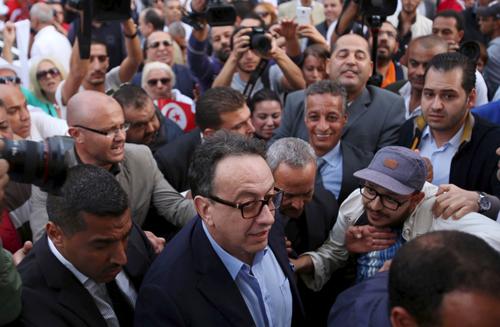You are here
Senior Tunisian ruling party member says to break away
By Reuters - Jan 07,2016 - Last updated at Jan 07,2016
TUNIS — A senior member of Tunisian President Beji Caid Essebsi's ruling party said on Wednesday he plans to break away and form a new political movement because of a perceived power play by Essebsi's son.
The rift in Nidaa Tounes, a secular movement formed after Tunisia's 2011 revolt against Zine Al Abidine Ben Ali, comes at a delicate time as the North African state struggles to contain jihadist violence and spur economic growth.
Divisions have been growing inside Nidaa Tounes — which means Call of Tunisia — since last year after a dispute emerged between a wing of the party led by Essebsi's son and another by Mohsen Marzouk, a leftist activist and one of its founders.
Marzouk leads a group of 30 Nidaa Tounes lawmakers, who threatened to resign over what they said were attempts by Hafhed Caid Essebsi to change regulations in a bid to exercise greater control over the party. The president denied those allegations.
Marzouk's backers see an attempt by Essebsi at a hereditary transfer of power and a return to the autocratic style of the Ben Ali era, though the president's allies dismiss claims they are looking to put his son in a position of influence.
"They left us no choice," Marzouk told reporters on Wednesday. "We tried in a positive way to reach a consensus, but the dialogue did not go as it should have."
He said he would formally announce the split from Nidaa Tounes at a party conference set for January 10 and launch the new party in March.
In the 217-member parliament, Nidaa Tounes has 82 seats. A split by 30 if its members would leave rival Islamist party Ennahda the strongest single block in the assembly with 69 seats. The rest are held by lawmakers from smaller parties.
With a new constitution and a consensus politics, Tunisia has been praised as a model of democratic transition since the ouster of Ben Ali. It has mostly avoided the violent upheaval of other states in the 2011 Arab Spring uprisings.
But after three major attacks by militants last year, Tunisia is struggling with severe security challenges. It needs reforms to help ease public spending and create the economic opportunities that many Tunisians hoped their revolution would deliver.
Nidaa Tounes emerged as a political force in 2013 to lead protests against a government formed by the Islamist party Ennahda. It beat Ennahda in elections in 2014 and went on to form a coalition with its rival.
Related Articles
TUNIS — Thirty lawmakers from Tunisia's ruling party suspended their membership on Wednesday and threatened to resign in protest over what t
TUNIS — At least 10 senior leaders quit Tunisia's ruling party on Wednesday, as a wave of resignations in a dispute over the role of the pre
TUNIS — After weeks of sharp disputes between its leaders, Tunisia's ruling party is on the verge of breaking up, which could allow Is















